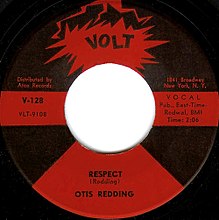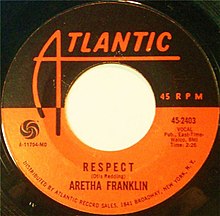Respect (song)
Respect is a song by Otis Redding from 1965. In the version by Aretha Franklin from 1967, the title became a million-seller in soul music .
History of origin
Original by Otis Redding
His third album Otis Blue was produced with Tom Dowd as a sound engineer in productive sessions on just three days at Stax Records in Memphis (Tennessee) . At that time there was already a blues-oriented mono version of Respect , because on July 9, 1965 the track was recorded again in stereo. The song is about the respect and appreciation the singer expects from his wife when he comes home from work. Redding's version only consisted of verses and chorus, not a song bridge . The high tempo of the composer Otis Redding, who otherwise specializes in soul ballads, is also unusual.
He was accompanied during the recording by Wayne Jackson and Gene "Bowlegs" Miller (trumpet), Andrew Love (tenor saxophone), Floyd Newman (bass), Isaac Hayes (piano), Booker T. Jones (organ), Steve Cropper (guitar) , Donald "Duck" Dunn (electric bass), Al Jackson (drums) and Earl Sims (backing vocals). That session band consisted of the core of the instrumental group Booker T. & the MG's and the Memphis Horns , which in this constellation acted separately or together as accompaniment for Stax recordings. The plate Respect / Ole Man Trouble (V # 128) reached following its publication on 15 August 1965 the fourth Rhythm & Blues - charts and 35 of Pophitparade. The album Otis Blue (recorded on April 19 and between July 9 and 10, 1965) was released on September 15, 1965 and reached number 75 on the US album charts.
Cover by Aretha Franklin
Producer Jerry Wexler saw even more crossover potential in the song and produced it with Aretha Franklin, who recorded her version on February 14, 1967 in New York City. A gospel-oriented version was created with co-producer Arif Mardin . Franklin was accompanied by the Muscle Shoals Rhythm Section , a session band from Fame Recording Studios : Melvin Lastie (trumpet), Charlie Chalmers (tenor saxophone), King Curtis (tenor and alto saxophone), Floyd Newman (bass), Dewey "Spooner" Oldham (organ, piano and electric piano), Jimmy Johnson (guitar), Tommy Cogbill (electric bass), Roger Hawkins (drums) and the backing choir of The Sweet Inspirations (with Franklin's sisters Carolyn and Erma). Bassist Floyd Newman was the only musician who had attended both sessions. In their version, King Curtis plays a part from When Something is Wrong With My Baby by Sam & Dave , which acts as a song bridge.
Franklin sings a modified text tailored to her female role. At that time in the United States, a woman could not claim social assistance if she lived with a man. Therefore, her version is about a woman who still receives welfare and leaves it to her (unofficial) husband when he comes home. Then all she expects is a little respect. Franklin's version is in C major and spells out the title to add tension. Their cover version surpasses the success of the original by far.
Initially only part of Franklin's album I Never Loved a Man the Way I Love You , Respect also received lively airplay in addition to the title song , so Atlantic Records decided to release Respect as a single. After the single Respect / Dr. Feelgood (Atlantic # 2403) on April 16, 1967, it reached first place in both the R&B (for eight weeks) and the pop hit parade (two weeks) and made it a million seller with well over a million copies sold.
Franklin's cover version was u. a. reproduced in the film The 200 Years of Man .
Excerpt
Even many Americans puzzled over the abbreviation found only in Franklin's version:
- RESPECT
- Find out what it means to me
- RESPECT
- Take care ... TCB
The last line is sometimes misinterpreted as “Take Out, TCP”, and most sheet music publications that contain the text adopt the wrong variant. "RESPECT" and "TCB" do not appear in Redding's original song, but were carried over to some of his later live appearances with the Bar-Kays .
"TCB" is an abbreviation in use up to the 1970s , which means Taking Care (of) Business (in German, for example , to take care of a matter ) and was used widely in Afro-American culture . Still, it was a little less known outside of that culture, which provides a possible explanation as to why it was not recognized by some transcriptors of Franklin's music. Elvis Presley's so-called Memphis Mafia also subscribed to the “TCB” motto; she did whatever and when he wanted it to. One of his private jets had this on it, and his last backing band was called the TCB Band .
reception
It was not until Aretha Franklin's version that the title became more widely known. He was therefore picked up by the feminist movement and made Franklin an international soul star. Respect is one of those songs that are considered trend-setting and representative of the 1960s. He appeared in many films and is one of the evergreens . Although she had numerous successes after Respect , the title became Franklin's trademark and her best-known recording. I Never Loved a Man the Way I Love You was in 2002 ranked 83 in the list of 500 best albums of all time of Rolling Stone voted Magazines. Two years later, Respect was number 5 on the list of the 500 best songs of all time . The song is part of The Rock and Roll Hall of Fame's 500 Songs that Shaped Rock and Roll list .
The music project 1,000 Days, 1,000 Songs published the title on its website in May 2017 as a protest against the policies of US President Donald Trump .
Statistics and awards
The BMI , according to 17 versions of the title are a total of registered, the song won a BMI Award. Coverinfo even lists 38 versions. Lesser-known versions come from regional groups like Michigan garage rock band The Rationals , whose 1966 version was played on radio stations in Detroit and a year ahead of the release of Aretha Franklin's version. The The Vagrants , a New York blue-eyed soul group from Long Iceland , in 1967 took a version of Respect , which in the eastern states came to a smaller success. The Rotary Connection also picked up the song they recorded for Chess Records in 1969 . The Dexys Midnight Runners kept adding the song to their live performances and recorded at least two live versions of it (e.g. BBC In Concert from May 30, 1981). A house version was recorded in 1989 by singer Adeva and came 17th in the UK Top 40 . The song was copied by the Basque fusion rock band Negu Gorriak and inserted into the 1996 cover album Salam, agur as "Errespetua" ( Respect in Basque ) . After the band split up, singer Fermin Muguruza continued to play his version of the song in some of his solo projects and it appeared as the closing song of his live album Kontrabanda - Barcelona, Apolo 2004-I-21 . In September 1975 Joy Fleming published a German version under the title Geld (Text: Michael Kunze ), which, however, missed the German hit parade. Aretha Franklin was allowed to sing her signature song at the birthday party of US President Bill Clinton on August 19, 1996.
In 1968 Aretha Franklin received two Grammy Awards for Respect for " Best Rhythm & Blues Recording " and " Best Rhythm & Blues Solo Performance by a Woman ". He was inducted into the Grammy Hall of Fame in 1998. On January 27, 2003, the Library of Congress honored Franklin's version by adding him to the National Recording Registry . It is ranked number 5 on Rolling Stone magazine's list of the 500 best songs of all time . It is also part of the America's Record Industry and NEA's Songs of the Century list .
media
- Otis Blue: Otis Redding Sings Soul . Volt Records / Atlantic Records, 1965. Memphis, TN.
- The Very Best of Otis Redding. Rhino / Atlantic Recording Corporation, 1992. Los Angeles, CA.
- I Never Loved a Man the Way I Love You . Atlantic Recording Corporation, 1967. New York, NY.
Individual evidence
- ^ Rob Bowman: Soulsville USA: The Story of Stax Records. 1997, p. 57.
- ^ Joseph Murrells, Million Selling Records , 1985, p. 241
- ↑ The 200 Years of Man (1999) - Soundtracks. In: Internet Movie Database . Retrieved August 16, 2018 .
- ^ Otis Redding: Respect 1965, Volt Records.
- ^ Matt Dobkin: I Never Loved a Man the Way I Loved You: Aretha Franklin, Respect, and the Making of a Soul Music Masterpiece . St. Martin's Press, New York 2004, ISBN 0-312-31828-6 , pp. 169-170 (English).
- ^ Eugene E. Landy: The Underground Dictionary . Simon and Schuster, New York 1971, ISBN 0-671-21012-2 (English).
- ↑ James Burton, Glen D. Hardin, Jerry Scheff, and Ronnie Tutt
- ↑ 1,000 Days, 1,000 Songs. Dave Eggers & Jordan Kurland, accessed June 1, 2017 .
- ↑ BMI entry for Respect ( page no longer available , search in web archives ) Info: The link was automatically marked as defective. Please check the link according to the instructions and then remove this notice.
- ^ Cover info entry about Respect
- ↑ Jet magazine. Volume 90, No. 21, from October 7, 1996, p. 20 ff. ( [1] )
- ↑ The Freewheelin 'Bob Dylan in the National Recording Registry. Retrieved August 14, 2017 .
- ↑ The RS 500 Greatest Songs of All Time . RollingStone.com. Retrieved June 2, 2007.

